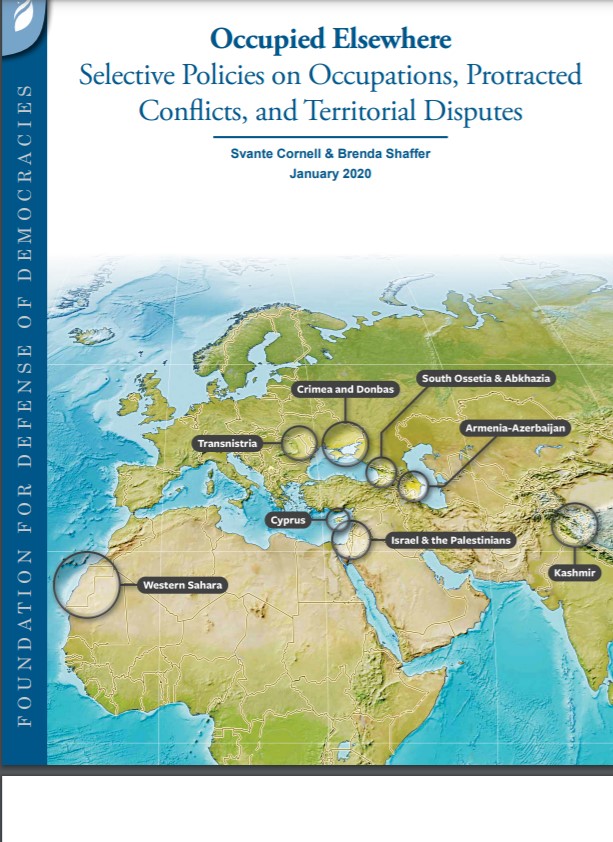Foundation for Defense of Democracies
January 27, 2020
Svante E. Cornell and Brenda Shaffer
 Setting policies toward territories involved in protracted conflicts poses an ongoing challenge for governments, companies, and non-governmental organizations (NGOs). Since there are multiple zones of disputed territories and occupation around the globe, setting policy toward one conflict raises the question of whether similar policies will be enacted toward others. Where different policies are implemented, the question arises: On what principle or toward what goal are the differences based?
Setting policies toward territories involved in protracted conflicts poses an ongoing challenge for governments, companies, and non-governmental organizations (NGOs). Since there are multiple zones of disputed territories and occupation around the globe, setting policy toward one conflict raises the question of whether similar policies will be enacted toward others. Where different policies are implemented, the question arises: On what principle or toward what goal are the differences based?
Recently, for example, the European Court of Justice (ECJ) decided goods entering the European Union that are produced in Jewish settlements in the West Bank must be clearly designated as such. At the same time, however, neither the ECJ nor the European Union have enacted similar policies on goods from other zones of occupation, such as Nagorno-Karabakh or Abkhazia. The U.S. administration swiftly criticized the ECJ decision as discriminatory since it only applies to Israel. Yet, at the same time, U.S. customs policy on goods imports from other territories is also inconsistent: U.S. Customs and Border Protection has explicit guidelines that goods imported from the West Bank must be labelled as such, while goods that enter the United States from other occupied zones, such as Nagorno-Karabakh, encounter no customs interference.
Territorial conflicts have existed throughout history. But the establishment of the United Nations, whose core principles include the inviolability of borders and the inadmissibility of the use of force to change them, led to the proliferation of protracted conflicts. Previously, sustained control over territory led to eventual acceptance of the prevailing power’s claims to sovereignty. Today, the United Nations prevents recognition of such claims but remains largely incapable of influencing the status quo, leaving territories in an enduring twilight zone. Such territories include, but are not limited to: Crimea, Donbas, Northern Cyprus, the West Bank, Kashmir, The Armenia-Azerbaijan Conflict, South Ossetia, Abkhazia, Transnistria, and Western Sahara.
The problem is not simply that the United Nations, United States, European Union, private corporations, and NGOs act in a highly inconsistent manner. It is that their policies are selective and often reveal biases that underscore deeper problems in the international system. For example, Russia occupies territories the United States and European Union recognize as parts of Ukraine, Georgia, and Moldova, yet Crimea is the only Russian-occupied territory subject to Western sanctions. By contrast, products from Russian-controlled Transnistria enter the United States as products of Moldova, and the European Union allows Transnistria to enjoy the benefits of a trade agreement with Moldova. The United States and European Union demand specific labeling of goods produced in Jewish settlements in the West Bank and prohibit them from being labeled Israeli products. Yet products from Nagorno-Karabakh – which the United States and European Union recognize as part of Azerbaijan – freely enter Western markets labeled as products of Armenia.
Today, several occupying powers try to mask their control by setting up proxy regimes, such as the Turkish Republic of Northern Cyprus (TRNC) or similar entities in Transnistria and Nagorno-Karabakh. While these proxies do not secure international recognition, the fiction of their autonomy benefits the occupier. By contrast, countries that acknowledge their direct role in a territorial dispute tend to face greater external pressure than those that exercise control by proxy.
Some territorial disputes have prompted the forced expulsion or wartime flight of the pre-conflict population. A related issue is the extent to which the occupier has allowed or encouraged its own citizens to become settlers. While one might expect the international system to hold less favorable policies toward occupiers that drive out residents and build settlements, this is not the case. Armenia expelled the Azerbaijani population of Nagorno-Karabakh, yet the United States and European Union have been very lenient toward Armenia. They have also been lenient toward Morocco, which built a 1,700-mile long barrier to protect settled areas of Western Sahara and imported hundreds of thousands of settlers there. Against this backdrop, the constant pressure to limit Israeli settlement in the West Bank is the exception, not the rule.
This pressure is even more difficult to grasp given that Israel’s settlement projects in the West Bank consist of newly built houses. In most other conflict zones, such as Northern Cyprus and Nagorno-Karabakh, settlers gained access to the homes of former residents.
This study aims to provide decision makers in government as well as in the private sector with the means to recognize double standards. Such standards not only create confusion and reveal biases, but also constitute a business and legal risk. New guidelines for making consistent policy choices are therefore sorely needed.


